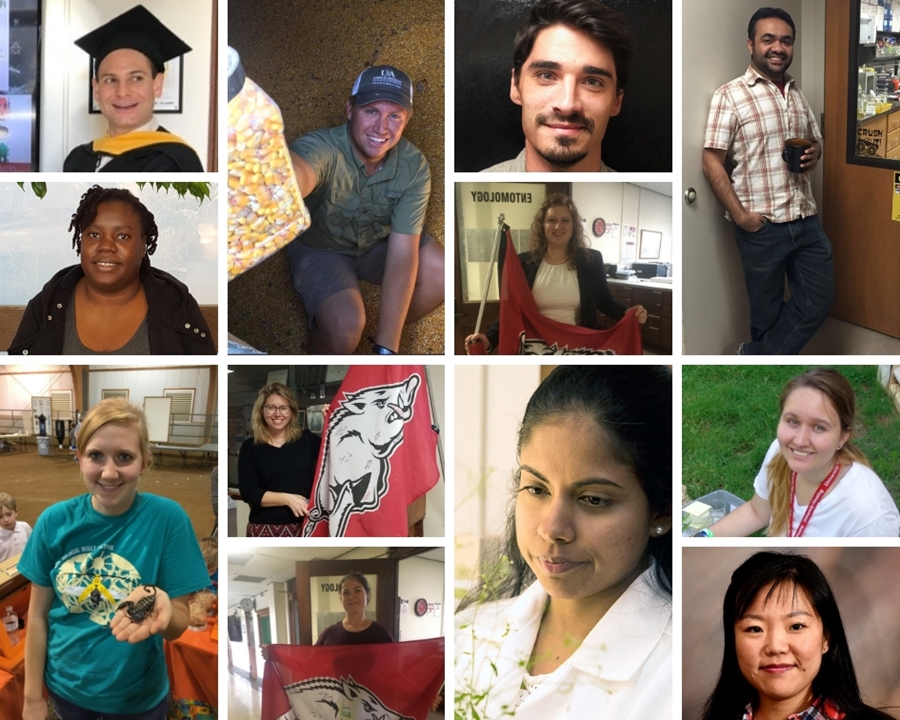
FAYETTEVILLE, Ark. — As entomology and plant pathology move toward a merged Department of Entomology and Plant Pathology, a combined 13 students who studied under faculty members in each area were awarded graduate degrees in 2018.
Joey Belsky
Joey Belsky, entomology, M.S., successfully defended his thesis, "Toxicity of formulated insecticide mixtures to Apis and non-Apis bees." Belsky was advised by Neelendra Joshi.
Belsky is currently working in an ecology lab at the University of California at San Diego, investigating pesticide impacts on Apis and non-Apis bee motor function. In the future, he plans to pursue a Ph.D. investigating pesticide impacts on bees.
Barry Boney
Barry Boney, plant pathology, M.S., successfully defended his thesis. "Understanding and predicting nematode damage on soybean using spatially weighted analysis." Boney was advised by Terry Spurlock.
Boney is a small business owner and consultant in southeast Arkansas.
Hazel Buyu
Hazel Buyu, plant pathology, M.S., successfully defended her thesis, "Defining the Genetic Regulation of Appressorium Formation in Cercospora zeae-maydis." Buyu was advised by Burt Bluhm.
Buyu is currently helping manage her family's farm in South Carolina as she explores careers in plant pathology.
Aaron Cato
Aaron Cato, entomology, Ph.D., successfully defended his dissertation, "Evaluation of rice stink bug, Oebalus pugnax (F.), damage and monitoring techniques in Rice, Oryza sativa (L.), and grain sorghum, Sorghum bicolor (L.)." Cato was advised by Gus Lorenz.
Cato is now a post-doctoral associate in Lorenz's research group.
Wagner Calegari Fagundes
Wagner Fagundes, plant pathology, M.S., successfully defended his thesis, "Molecular basis of pathogenesis and host determination in Cercospora sojina: From phenotypic to genotypic patterns." Fagundes was advised by Bluhm.
Fagundes is now working on a Ph.D. at the Max Planck Institute for Evolutionary Biology in Kiel, Germany. He will be working with Eva Stukenbrock on aspects of host specialization of different fungal species of Zymoseptoria.
Beth Ferguson
Beth Ferguson, entomology, Ph.D., successfully defended her dissertation, "Impact of roadside maintenance practices on Larinus minutus, a biological control agent of spotted knapweed." Ferguson was advised by Robert Wiedenmann.
Ferguson is an ORISE post-doctoral fellow working with Jarrad Prasifka on plant-pollinator interactions at the USDA ARS Northern Crop Science Lab in Fargo, North Dakota.
Sandeep Sharma Khatiwada
Sandeep Sharma, cell and molecular biology, Ph.D., successfully defended his dissertation, "Combining translational and functional genomic approaches to augment Management Strategies of Plant Parasitic Nematodes." Sharma was advised by Bluhm.
Sharma is a postdoctoral associate in the Department of Plant Pathology and Plant-Microbe Biology at Cornell University. He is working with fungal pathogens of vegetable crops such as onion, garlic and beets.
Rose Knipp
Rose Knipp, entomology, M.S., successfully defended her thesis, "Spotted wing drosophila (Drosophila suzukii) in Arkansas: Winter morphs, wild hosts, and fungal control." Knipp was advised by Don Steinkraus.
Knipp currently works as a lab assistant at the University of Missouri.
Jessica LeFors
Jessica LeFors, entomology, M.S., successfully defended her thesis, "Seasonal phenology, distribution and treatments for Polyphagotarsonemus latus (Banks) on the Primocane-fruiting blackberries (Rubus L. subgenus Rubus) in Arkansas." LeFors was advised by Donn Johnson.
LeFors works as an adjunct faculty instructor at Texas A&M University at Texarkana, teaching biology I and II labs, and serves as the principal investigator for a student's independent research project.
Whitney Nelson
Whitney Nelson, entomology, Ph.D., successfully defended her dissertation, "Revision of the genus Monatractides (Parasitengona, Torrentticolidae) of the United States and Canada: New species, re-descriptions, phylogenetics, and a key to species." Nelson was advised by Ashley Dowling.
Nelson is now working as a research scientist for the Animal Health and Nutrition Division of Novozymes, an international company with a campus in Arkansas.
Janithri Wickramanayake
Janithri Wickramanayake, entomology, Ph.D., successfully defended her dissertation, "Influence of function of the fatty acid Desaturase 7 gene on photosynthetic activity and foliar redox status." Wickramanayake was advised by Fiona Goggin.
Wickramanayake is currently a post-doctoral associate in Goggin's lab.
Mary-Kate Williams
Mary-Kate Williams, entomology, M.S., successfully defended her thesis, "Molecular survey for the honey bee Ttpanosom parasites, Crithidia mellificae and Lotmaria passim." Williams was advised by Allen Szalanski.
Williams works in the Department of Biology at Utah State University. She does research in microbiology, ecology and entomology. Her current project focuses on pathogens and viruses in solitary bees.
Jing Zhou
Jing Zhou, plant pathology, Ph.D., successfully defended her dissertation, "Epidemiological studies of soybean vein necrosis virus and potential resistance mechanisms to its vector Neohdatothrips variabilis (Beach.)" Zhou was advised by Ioannis Tzanetakis.
Zhou begins work in March as a research scholar at the Center of Plant Health Science and Technology with USDA Animal and Plant Health Inspection Service.
About the Dale Bumpers College of Agricultural, Food and Life Sciences: Bumpers College provides life-changing opportunities to position and prepare graduates who will be leaders in the businesses associated with foods, family, the environment, agriculture, sustainability and human quality of life; and who will be first-choice candidates of employers looking for leaders, innovators, policy makers and entrepreneurs. The college is named for Dale Bumpers, former Arkansas governor and longtime U.S. senator who made the state prominent in national and international agriculture.
About the University of Arkansas: The University of Arkansas provides an internationally competitive education for undergraduate and graduate students in more than 200 academic programs. The university contributes new knowledge, economic development, basic and applied research, and creative activity while also providing service to academic and professional disciplines. The Carnegie Foundation classifies the University of Arkansas among only 2.7 percent of universities in America that have the highest level of research activity. U.S. News & World Report ranks the University of Arkansas among its top American public research universities. Founded in 1871, the University of Arkansas comprises 10 colleges and schools and maintains a low student-to-faculty ratio that promotes personal attention and close mentoring.
Topics
Contacts
Heather Jorgensen, program specialist
Entomology and Plant Pathology
479-575-2451,